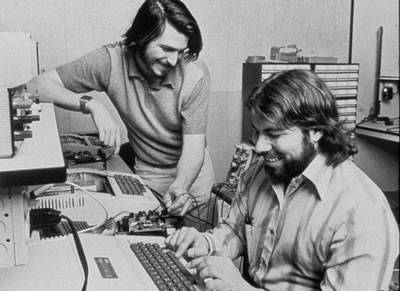What’s the most significant thing Steve Jobs created? The culture of innovation at Apple, a culture designed around a fanatical desire to provide the tools to unleash our creativity, the tools to make us “insanely great.” That’s a culture that goes deep in the Apple organization. It’s a culture that’s focused on the minute details of the user experience, like the calendar icon that just happens to show today’s date on it. We buy their products not because the products are insanely great but because they will make US insanely great, or at least have the power to make us believe that about ourselves.
Did he really create a culture of innovation or was he just a one man shop? one proof point is that he did it three times, once at Apple, then at Pixar and then again at Apple again. The culture at Pixar has the same compulsion to go into insane detail in the production of their movies, a fanatical focus on the user –this time, viewer — experience.
Apple has a culture with an constantly expanding ability to connect the dots: Apple has become famous for connecting the dots between art and technology. They learned early to focus on the intersection of trends — Jobs had an uncanny understanding of the intersection of what’s possible and what’s next. He looked at the world of hobbyist computer geeks in the 70s and realized there were real world things other people could do with a computer at home. In the 80s, he looked at how people used computers and realized a graphical user interface would change the experience radically; again, making interacting with a computer a real-world experience. In the 90s, he understood people had a relationship with their device and, as they began to use their Macs as communication devices over the Internet, they wanted a device that was more than just a commodity product as computers had become by that time. Moving into the last decade, he saw that, with the Web, computers were fast becoming media devices that not only could play music and videos but could store them, transmit them, even buy them. Is it possible that Jobs was the only one who understood any of this and everyone else at Apple just went along? Hardly. It’s cultural now at Apple. And you better learn to make it cultural at your company, too.
Apple has a culture that tells it like it is. Jobs was authentic to the bone and short on small talk. If you read the stories of those who knew him and worked with him it’s pretty clear that he didn’t pull many punches, he would tell it like it is. Between his brashness and charisma, you always knew where you stood and perhaps more important, where your ideas stood.
So many great ideas die a slow death in companies due to lack of decisiveness and clear communication. While Jobs was known for cancelling as many prototypes as the ones he advanced, he created a “yes-fast” culture where things moved with speed and agility because he didn’t waste words or time. You read the stories of employees, suppliers and friends who would get calls at 3:00 a.m. from an agitated and restless Jobs because Steve wanted to resolve an issue or make sure that a delivery was on track. It appears that this sence of urgency, get-it-done-now mentality is part of Apple’s cultural DNA and will be quite difficult to undo.
Apple has a culture that questions the unquestionable. Many of the things we love Apple for were things that others tried before and proved were impossible. But Apple did them anyway and succeeded. There were plenty of computer companies that tried to create PCs with proprietary operating systems. Everyone failed but Apple. Others had tried to have stores to sell computers and everyone knew that would never work. Then here come the Apple Stores. Others tried to move into personal devices and media devices. They failed, Apple succeeded. And no one would have dared try to come up with an alternative to the traditional music distribution model. Talk about something impossible. And then Apple introduces iTunes. Time and time again, they’ve done the impossible. So, is it impossible for them to continue innovating without Steve Jobs at the helm? Not at all.
Apple has a culture that accepts NOTHING short of elegance. One of Jobs’ gifts – and now part of Apple’s way of doing business is — the sheer discipline to push beyond the easy, most obvious answer to the elegant one. Apple has fanatical customers for a reason. As a user the company’s passion for coherent design causes you to think: Someone who really understands me was here before. Someone knew me well enough to know that I would be here now, with this issue or this need, and they already solved it for me. Or, more important, they empowered me to solve it myself.
Elegance in design isn’t something you add to a product after the fact. It inhabits the design process from the moment of conception. And our work has led us to believe that elegance begins even before you begin to design a solution: Elegance stems from a fantastically clear definition of the problem you’re seeking to solve. Einstein said if he had 20 days to solve a problem, he’s spend the first 19 days defining and understanding it. Apple builds elegant solutions to problems we didn’t know we had and they do it by first creating an elegant understanding of the problem itself.
Apple has culture that constantly seeks to elevate the dignity of the end user. Like we said above, Apple doesn’t tell us to buy their products because they’re great. The tell us to buy their products because the products will make us great. Insanely great. More creative and more productive. They had a clear mission and people went to work at Apple to be part of that mission. That wasn’t one man’s mission, although he held the vision for it. But he also shared that vision everyday. He gave it away to anyone who worked at Apple. And it’s there today, driving them forward, as much as ever.



